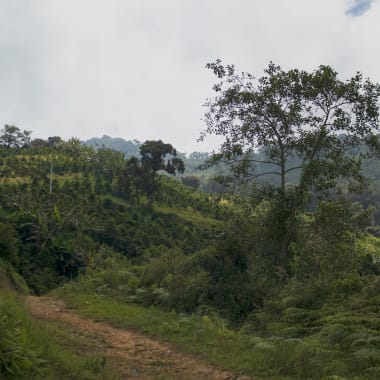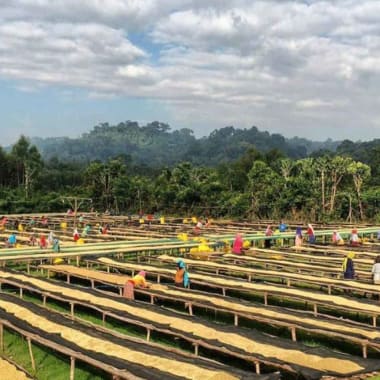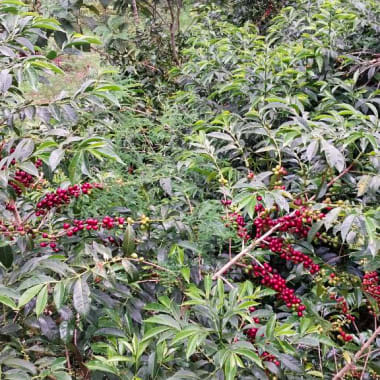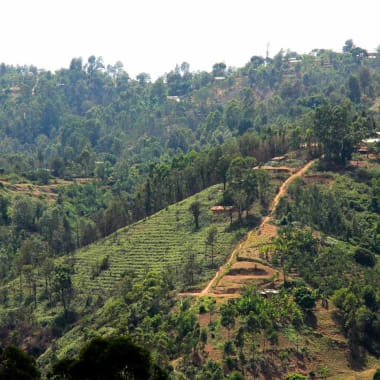Kenya
Rinjagi
We find flavours of cranberry, stewed peach, sherbert
Rianjagi factory is owned and operated by the Rianjagi Farmers Cooperative Society, which was built in 1950.
It’s now made up of just over 1,500 member farmers, and the cooperative is managed by a board of five elected representatives, one for each of the electoral zones in the area. The co-op also has a permanent staff of eight who are overseen by a secretary-manager.
Coffee is delivered by local farmers the day that it’s picked, and is sorted for quality at the mill before being depulped and processed. After de-pulping, the coffee is fermented overnight and washed with fresh river water, then placed on drying tables.
Sourcing and ingredients
100% SL28, SL34, Ruiru 11, Batian, and K7 coffee beans, provided by Cafe Imports and roasted by us on Gadigal land / Sydney.
Country grade: Unknown ?
Packaging
Bag: ABA Certified home compostable
Label: Recyclable
Valve (on bags larger than 250g): General waste
Coffee ordered online is shipped in a recyclable cardboard box
Brewing this coffee
We recommend brewing this coffee 15–49 days post-roast. If pre-ground, brew as soon as possible. Our advice on storing coffee.
1:3
dose:yield
ratio
To brew on espresso, we recommend using 20g of beans (dose) to get 60g of espresso out (yield), during 24-28 seconds.
1:16.7
beans:water
ratio
To brew in infusion/fed brewers (V60, Chemex) use a ratio of 1:16.7 ratio of beans:water.
1:14.3
beans:water
ratio
To brew in immersion brewers (plunger, AeroPress, Kalita, batch brewer) we recommend using a 1:14.3 ratio of beans:water
1:12
beans:water
ratio
To brew as cold brew we recommend using a 1:12 ratio of beans:water
Varietals
Batian varietal
Batian is the latest variety to be developed in Kenya, it is named after the peak of Mount Kenya
Ruiru 11 varietal
Released in 1985, Ruiru 11 is a disease resistant varietal developed in Kenya
SL28 varietal
SL28 was developed in 1931 by Scott Laboratories to suit the growing conditions in Kenya. The varietal is known for its exceptional cup quality
SL34 varietal
Developed by Scott Laboratories in Kenya, the SL34 varietal was designed to be high yielding with good cup quality.
The location
Coffee from Kenya
Alongside Ethiopia and Colombia, Kenya is one of the origins we get most excited about at the roastery. It exports some of the most vibrant, bright, and unique coffees in the world.
The Embu region of Kenya
Named after the town of Embu, also near Mount Kenya and its fertile growing conditions
Farm processes
Washed process
Machines are used to remove the flesh from the coffee cherry before being fermented in water, washed again, and finally sun dried. This process tends to result in more distinct, cleaner flavours.

Subscribe to a world of coffee
Discover a new single origin coffee from Sample every 1-5 weeks with no delivery fees.
No up-front purchase, and you can pause, cancel, or change plans at any time.
Available to order online this week:

Colombia Canta Ranas
Flavours of yellow peach, orange juice, raspberry, rosehip
Body Acidity
Washed Chiroso
May 2024 harvest
Roasted omni for filter and espresso
Colombia Canta Ranas online
Ethiopia Kecho Anderacha
Flavours of candied lemon, white peach, bergamot
Body Acidity
Washed Ethiopian Heirloom
November 2023 harvest
Roasted omni for filter and espresso
Ethiopia Kecho Anderacha online
Ethiopia Bekele Gemeda
Flavours of orange marmalade, peach, apricot
Body Acidity
Washed Ethiopian Heirloom
January 2024 harvest
Roasted omni for filter and espresso
Ethiopia Bekele Gemeda online
Kenya Gathaithi
Flavours of burnt toffee, orange, cola
Body Acidity
Washed SL-28, SL-34, Ruiru 11, Batian
November 2023 harvest
Roasted omni for filter and espresso
Kenya Gathaithi online